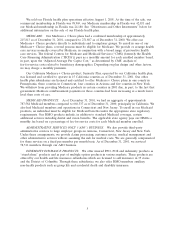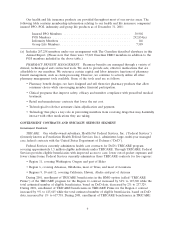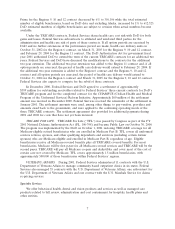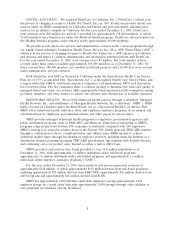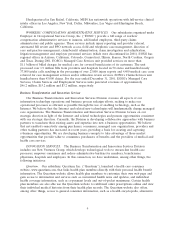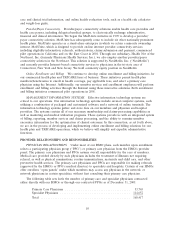Health Net 2001 Annual Report Download - page 16
Download and view the complete annual report
Please find page 16 of the 2001 Health Net annual report below. You can navigate through the pages in the report by either clicking on the pages listed below, or by using the keyword search tool below to find specific information within the annual report.with state laws and regulations and may from time to time be required to change services, procedures
or other aspects of its operations to comply with changes in applicable laws and regulations. In
addition, HMOs must file periodic reports with, and their operations are subject to periodic
examination by, state licensing authorities. HMOs are required by state law to meet certain minimum
capital and deposit and/or reserve requirements in each state and may be restricted from paying
dividends to their parent corporations under some circumstances. Several states have increased
minimum capital requirements, in response to proposals by the National Association of Insurance
Commissioners to institute risk-based capital requirements. Regulations in these and other states may
be changed in the future to further increase capital requirements. Such increases could require us to
contribute additional capital to our HMOs. Any adverse change in governmental regulation or in the
regulatory climate in any state could materially impact the HMOs operating in that state. The HMO
Act and state laws place various restrictions on the ability of HMOs to price their products freely. We
must comply with applicable provisions of state insurance and similar laws, including regulations
governing our ability to seek ownership interests in new HMOs, PPOs and insurance companies, or
otherwise expand our geographic markets or diversify our product lines.
Insurance Regulations. State departments of insurance (the ‘‘DOIs’’) regulate our insurance and
third-party administrator businesses under various provisions of state insurance codes and regulations.
Our subsidiaries conducting these businesses are subject to various capital reserve and other financial,
operating and disclosure requirements established by the DOIs and state laws. These subsidiaries must
also file periodic reports regarding their regulated activities and are subject to periodic reviews of those
activities by the DOIs. We must also obtain approval from, or file copies with, the DOIs for all of our
group and individual insurance policies prior to issuing those policies.
PENDING FEDERAL AND STATE LEGISLATION. There are a number of legislative initiatives
and proposed regulations currently pending at the federal and state levels which could increase
regulation of the health care industry. These measures include a ‘‘patients’ bill of rights’’ and certain
other initiatives which, if enacted, could have significant adverse effects on our operations. See
‘‘Cautionary Statements—Federal and State Legislation’’ below. For example, one version of the
proposed ‘‘patients’ bill of rights’’ would allow an expansion of liability for health plans. We cannot
predict the outcome of any of the pending legislative or regulatory proposals, nor the extent to which
we may be affected by the enactment of any such legislation or regulation.
ACCREDITATION. We pursue accreditation for certain of our health plans from the National
Committee for Quality Assurance (‘‘NCQA’’) and the Joint Committee on Accreditation of Healthcare
Organizations (‘‘JCAHO’’). NCQA and JCAHO are independent, non-profit organizations that review
and accredit HMOs. HMOs that comply with review requirements and quality standards receive
accreditation. Our HMO subsidiaries in California and Arizona have received NCQA accreditation.
Certain of our other health plan subsidiaries are in the process of applying for NCQA or JCAHO
accreditation. The utilization review activities of our subsidiary, EOS Managed Care Services, are
accredited by Utilization Review Accreditation Commission also known as the ‘‘American Accreditation
Healthcare Commission’’.
SERVICE MARKS
We have filed for registration of and maintain several service marks, trademarks and tradenames
that we use in our business, including marks and names incorporating the ‘‘Health Net’’ phrase. We
utilize these and other marks and names in connection with the marketing and identification of
products and services. We believe such marks and names are valuable and material to our marketing
efforts.
15


